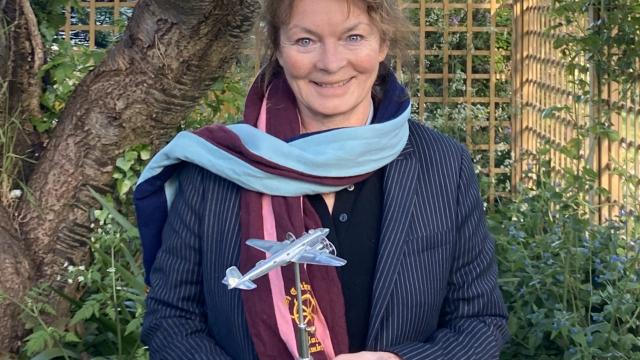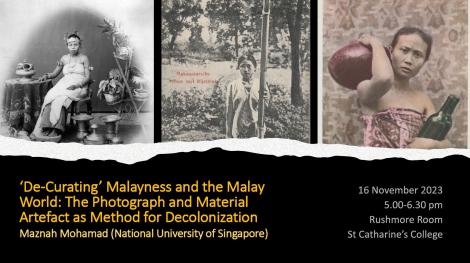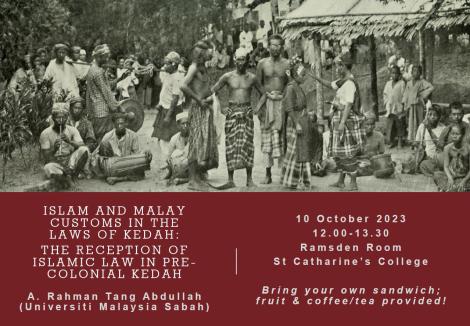
Upcoming events
How Courts Self-Empower: Constitutional Statecraft and Judicial Strategy
20 February 2024, 5-6.30pm: A talk by Yvonne Tew
McGrath Centre, St Catharine's College
When courts seek to strengthen their own institutional power, they often need to employ statecraft. In many fraught political contexts, judiciaries lack a history of asserting authority against powerful political actors. How can courts with fragile authority establish and enhance judicial power? Yvonne Tew explores how and when courts around the world employ various strategies aimed at enhancing their institutional position vis-à-vis other branches of government. Drawing on examples from Southeast Asia, South Asia, Africa, and the UK, she discusses the ways in which judges use tools of statecraft to engage in constitutional state-building and to enhance their role in the constitutional order.
This talk will be based on Professor Tew’s following publications: Constitutional Statecraft in Asian Courts (Oxford University Press, 2020) and Strategic Judicial Empowerment (American Journal of Comparative Law, forthcoming 2024).
Yvonne Tew is Professor of Law and Anne Fleming Research Professor at Georgetown University Law Center in Washington, D.C. She is currently the Faculty Director and Academic Co-Director of the Center for Transnational Legal Studies in London. She has expertise in constitutional law, in global and comparative perspective, as well as law and religion. She is the author of Constitutional Statecraft in Asian Courts (Oxford University Press, 2020). Her scholarship has been published in many law journals and book collections, and she currently serves on the Executive Editorial Board of the American Journal of Comparative Law. She has advised international organizations and government officials globally on a range of constitutional matters including judicial power, rights protection, and constitutional reform.
Professor Tew holds a Ph.D. from the University of Cambridge, where she was a Gates Cambridge Scholar and Tunku Abdul Rahman Honorary Scholar at St Catharine’s College. She graduated from Harvard Law School with a Master of Laws and received her B.A. in Law from the University of Cambridge, with Double First Class Honours. Prior to joining the faculty at Georgetown, she held research fellowships at Columbia Law School and New York University School of Law.
2023–24
‘De-Curating’ Malayness and the Malay World: The Photograph and Material Artefact as Method for Decolonization
16 November 2023: A seminar led by Maznah Mohamad, National University of Singapore
This seminar questions how the conception of ‘Malayness’ and the ‘Malay world’ had been encapsulated through colonial collections of artefacts and photographs. For almost a century, and beyond, the notion of being Malay is politically framed and territorially delineated by the reach of the British empire. Processes and events spatially beyond these or spread throughout an oceanic space, or contain elements of ambiguity, or of a past before colonialism were in many instances, elided from being named, archived and curated. The institutionalisation of ‘Malay Studies’ set within nationalist concerns has also been one of the strongest vestiges of this leaning. My seminar provides a case for the re-viewing of Malay world colonial artefacts and photographic materials in order to create the possibility of new ways of curating exhibitions and visual representations of a much larger, fluid, and oceanic Malay world. Understanding and encoding the processes and mechanics of a gendered, racialised and hierarchised representation through both artefacts and photographed subjects will also address some of the issues and ethics in the (mis)representation of peoples and their dignity. Photographs from the Fischer Collection and Royal Photographic Society kept in British repositories, and museum-held Malay artefacts and objects collected more than a century ago by colonial collectors would be referenced as examples of some possibilities for a ‘de-curating’ exercise.Islam and Malay Customs in the Laws of Kedah: The Reception of Islamic Law in Pre-Colonial Kedah
10 October 2023: A talk by A. Rahman Tang Abdullah (Universiti Malaysia Sabah)
This talk is to discuss the reception of Islam and the realization of Islamic law in Kedah before the Colonial period in Malaya. The Islamic law centres around the practice of Sharia law. Nevertheless, in terms of criminal law, the Malay customary law prevailed and was more dominant even though the Islamic jurisprudence stipulates that al-Hudud, especially, must be given specific attention because it is regarded as the most fundamental element in the concept and realisation of Sharia law. This premise is derived from the content analysis on various traditional Malay legal texts of Kedah and close examination on the provisions prescribed according to Islamic jurisprudence.
2022–23
Malaysians at Catz: a Research Showcase
26 Oct 2022: Held in conjunction with the Postgraduates’ and Fellows’ seminar series, this was part of a series marking the 100th anniversary of the admission of Malaysia’s first Prime Minister, Tunku Abdul Rahman, to St Catharine’s College.
Featuring research presentations by four Malaysian postgraduate students:
-Tan Chee Yong, The Malayan Dilemma: Race, Power and State-building in Malaysia
-Cynthia L. James, Teachers and Technology in Rural Malaysian Classrooms: Insights from the T4 Global Survey
-Wong Shu Ling, Why do Malaysian adolescents use social networking sites? A preliminary analysis
-Chan Shun Wen, British Commercial Perspective during the Second-Sino Japanese War (1937-1945)
Commonwealth man through and through: Tunku Abdul Rahman and the decolonisation of the global order
17 November 2022: A lecture by Muhammad Suhail Bin Mohamed Yazid, Faculty of History, part of a series of events marking the 100th anniversary of the admission of Malaysia’s first Prime Minister, Tunku Abdul Rahman, to St Catharine’s College.
While commonly remembered as Malaysia’s first prime minister and its preeminent nationalist, Tunku Abdul Rahman was many things. He too was an ardent believer of the British-led Commonwealth of Nations. How did he use Malaysia’s emplacement in this fraternity of nations to define his politics? In trying to strengthen his political position in Malaya (Malaysia after 1963), the Tunku creatively employed a Commonwealth-based internationalism to shape power relations within and beyond the nation-state. Three projects in particular demonstrate how he made this internationalism serviceable for power: the struggle for Malayan self-determination, the isolation of apartheid South Africa and the establishment of an international pan-Islamic organisation. Operating in the context of global decolonisation and the Cold War, the Tunku adapted the liberalist idioms of the post-war Commonwealth and harnessed the association’s networks to pursue these ambitious projects. Each one of these projects contains a story of Malaya’s uneven relationships with other Global South states, even as they built solidarities to flatten hierarchies in the postwar global order. By looking closely at the Tunku's efforts to reformat national and international relations, the Tunku can be recasted as a ‘worldmaker’.
Social Cohesion in Malaysia: “Agree to Agree, Agree to Disagree”
10 March 2023: A public lecture byShamsul Amri Baharuddin (Universiti Kebangsaan Malaysia) to commemorate the 100th anniversary of Tunku Abdul Rahman’s admission to St Catharine’s College
After the Second World War, for 25 years (1945-1969), even after its independence in 1957, Malaya/Malaysia experienced numerous bloody clashes, mainly between ethnic Chinese and Malays, involving loss of life and property. The biggest incidence of conflict was on the 13 May 1969 centring around Kuala Lumpur. For a period of five years after that (1969-1974), there were intense top-down efforts to rebuild ‘national unity’, first by the establishment of a Department of National Unity in July 1969 leading to the formation of a Ministry of National Unity in January 1972, until July 1974 when the Ministry was dissolved. However, the Department of National Unity was retained and, subsequently, became a component of several different ministries over the next four decades, for many years it was under the Prime Minister’s Office. Despite these changes the government’s unity effort continued to be guided by a monolithic conceptual notion of unity at the national level, expressed in political slogans, billboards, and national branding in general.
In 2013, a National Unity Consultative Council (NUCC) was established to reevaluate the state of national unity and to redefine the monolithic notion of unity, introduced 44 years ago in 1969, by replacing it with a ‘triconcept of unity’, in other words having three facets: unity, cohesion reconciliation, with social cohesion at its core. This was endorsed by the Malaysian Cabinet in August 2015. The renamed Department of National Unity and Integration was tasked to draw up an action plan based on the new ‘triconcept of unity’ and to construct a National Unity Index (IPNas), begun in 2017 and completed in 2018.
In 2018, Malaysia experienced for the first time a major change of government when the 60-year-old Barisan Nasional (BN) coalition government lost to the Pakatan Harapan coalition (PH). However, the new government led by Mahathir, the former Prime Minister (1981-2003), reinstated as the Prime Minister again, lasted only 22 months. It was replaced by another fragile coalition in 2020 led by former UMNO & PH politician, Muhyiddin, that lasted for 17 months. During this period a standalone Ministry of National Unity was established in March 2020. It introduced for the first time a National Unity Policy (2021) and a Blueprint for National Unity (2021-2030). In August 2021 a second unstable coalition took over from the collapsed Muhyiddin-led coalition. It was led by a new PM, Ismail Sabri, who then launched, in November 2021, the National Unity Action Plan (2021-2030). The second National Unity Index 2022 was completed before the Parliament was dissolved in October 2022.
After the 15th General Elections on 19 November 2022, a new government led by yet another makeshift coalition with a new PM, Anwar Ibrahim, was formed. Coincidentally, it is called ‘the Unity Government.’ The Ministry of National Unity remains in the new cabinet, led by a new minister from Sarawak. All the documents related to national unity with its tripartite concept have now been endorsed by the Ministry. After more than five decades (1969 to 2022), 12 general elections, and 10 prime ministers Malaysia has enjoyed peace, stability, economic growth, and a relatively satisfactory level of well-being with the absence of violence.
This presentation traces the evolution of the understanding of unity or national unity, official and popular, during this period, from a monolithic (1969) to a triconcept of unity (2013). These three faceted concepts were first operationalised in the National Unity Index 2018 and has become the basis of the National Unity Policy (2021), the Blueprint for National Unity (2021) and the Action Plan for National Unity (2022). This evolution has been dominated by contestations and consensus revealing a set of ten unresolved ‘social deficits’ within which Malaysians have framed their dissatisfactions, all conducted in the absence of violence. In this paper I wish to emphasise that this is due to the ability of Malaysians, both at the top leadership and rakyat at the grassroots, to accept the importance of social cohesion and be guided to a state of social harmony through the principle of “agree to agree and agree to disagree” which is anchored in a continuous process of bargaining, negotiation, and mediation.
Mysterious Gravestones in Southeast Asia: Persianate Inscriptions in Indonesia
22 May 2023: A talk by Majid Daneshgar (Cambridge University Libraries Munby Fellow/St John’s College)
Through this talk, the role of Persian and Persianism in the early period of Islamization in the Malay-Indonesian World is demonstrated. Daneshgar discusses a number of gravestones, including unique Persian inscriptions whose existence may change the discourse, leading to a much closer connection between the Persianate and the Malay-Indonesian Worlds.
Developing a sustainable and ecological model for the Malaysian durian industry with a focus on producers
21 June 2023: A talk by Khoo Gaik Cheng (University of Nottingham Malaysia)
Although the durian (durio zibethinus) is much maligned by its pungent smell in the west, there is a huge demand in China for this Southeast Asian fruit. Currently Thai monthong durians take 85% of the China market while Malaysia only covers 10%. The prices of premium Malaysian durians like Musang king (and increasingly Black Thorn) are quadruply higher than the Thai monthong and only 3% of Chinese are consuming durian. Such figures have led to a race to scale up from small 3-10 acre family orchards to 10,000 acre plantations, with durian plantation developers calling durian ‘the new agricultural gold’ supported by hashtags on social media like “everyone can own durian land” to entice potential investors. At whose cost, begs the unasked question. Deforestation for logging, oil palm and now durian plantations have led to the displacement of indigenous communities and reason for indigenous blockades in Gua Musang, Kelantan. Last year, leftover debris and logs on a deforested area of some 30,000 acres left bare and a burst retention pond on a durian plantation in Gunung Inas during heavy rains led to floods and loss of 3 lives. Deforestation has exacerbated wildlife-human conflict, threatened the tiger habitat and sped up the loss of biodiversity. What mitigation measures have been taken? How can the durian boom contribute in equal measure to “environmental sustainability, economic empowerment and social re-engineering” over time? Can agro-tourism be an ecological contributor to a sustainable durian economy? Relying on interviews with relevant stakeholders along the supply chain supplemented by online data, this presentation will focus on illustrating a range of diverse approaches to durian production. I show that understandings and practices of sustainability vary among the durian producers and stakeholders, depending on the scale, amount of capital, and their balance of relationships both human and nonhuman.
2021–22
In the Shadow of the Palms
11 May 2022: A book talk by Sophie Chao (University of Sydney), with responses by Maan Barua, Liana Chua and Rupert Stasch.





